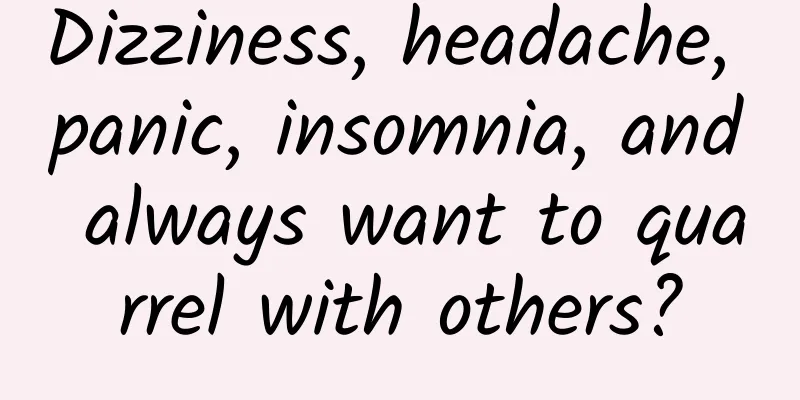Dizziness, headache, panic, insomnia, and always want to quarrel with others?

|
Expert of this article: Zhao Wei, deputy chief physician of Department of Neurology and Sleep Medicine Center, Tianjin University Teda Hospital It’s the end of another year, and for some people, the holidays are a roller coaster of emotions. Before the holidays, I was full of longing for them, as they represent "poetry and distant places". During the holidays, people let themselves go in various ways, such as partying, staying up late, watching TV series, and going out and eating. However, after the hustle and bustle of the holiday, people will fall into low mood or depression, and it is difficult to adapt to normal work and life. These are all related to "pre-holiday syndrome" and "post-holiday syndrome". So what exactly are pre-holiday syndrome and post-holiday syndrome? And how to treat them? Let's take a look Why do we feel more stressed as the holidays approach? Pressure at work Various "performance sprints" and "year-end assessments" are the norm at the end of the year in many units. The sudden increase in workload and frequent overtime work can make people feel overly stressed. Additionally, you're trying to get work done before you go on vacation, which can make you more prone to burnout and anxiety. Stress in life Buying New Year's goods, paying off credit cards, grabbing train tickets, the long journey home, parents forcing marriage, visiting relatives and friends, buying gifts for parents and children, etc., these things can all give people a headache. Especially for those who barely make ends meet throughout the year and have not received a salary at the end of the year, the holiday makes them feel more uneasy. For special types of workers, they need to stay at their posts during holidays and prepare emergency plans for various emergencies. For example, medical staff, police, firefighters, media workers and other groups are more likely to feel anxious. If these pressures cannot be relieved and eliminated in time, pre-holiday syndrome will occur, which is manifested as low work efficiency, negative work attitude, irritability, inability to control one's emotions, and easy quarrels with people around. Some people will also show physical symptoms, such as dizziness, headache, palpitations, insomnia, etc. Of course, some people may ask: Why are you not in the mood to work after returning from vacation? What are the symptoms of post-holiday syndrome? Some people cannot get back into work mode quickly after the holidays, and they are inefficient at work and yawn all day long. The specific manifestations of post-holiday syndrome are: difficulty concentrating, dizziness, loss of appetite, depression, insomnia, etc. The severity of the symptoms depends on the individual's ability to adapt. The longer the holiday, the longer the post-holiday syndrome lasts. It usually takes 10 to 15 days to return to normal work. This is mainly due to: 1. Irregular sleep and disrupted circadian rhythm during holidays. During the holidays, people are accustomed to going to bed late and getting up late. Staying up late for parties, playing cards, and watching TV series will disrupt the body's normal biological clock and cause delayed sleep phases. Even at night after the holidays, the brain still thinks it is not time to go to bed, which will cause insomnia. You need to get up early the next day, and insufficient sleep will lead to lack of energy and fatigue during the day. 2. The vacation was not as good as imagined, or the planned vacation plan was not realized. Maybe your travel plans were canceled due to the epidemic, or you experienced a holiday with traffic jams on the highway and crowded attractions. Maybe you feel guilty about spending several months' pay on a vacation or gaining weight. 3. Irregular diet and excessive burden on the gastrointestinal tract. Irregular diet during holidays, excessive intake of meat and fish, alcohol, beverages and junk food will increase the burden on the gastrointestinal tract, manifesting as abdominal bloating, abdominal pain, etc. These symptoms are particularly likely to occur in people with chronic digestive system diseases such as peptic ulcers. How to adjust your status before and after the festival? "Pre-holiday syndrome" and "post-holiday syndrome" often occur in the same type of people, which shows that these people are used to avoiding stress. 1. It is not advisable to set goals too high in normal times. If you complete a small goal, you will feel particularly happy. If you set a goal that is too high and difficult to accomplish before the holiday, you will feel frustrated. Usually, follow your work plan step by step to complete it, and don't procrastinate. If there is still a lot of work to be completed before the holiday, it is easy to get into bad mood. 2. Keep a calm mind before the festival. Don’t think of holidays as being too beautiful. Holidays are not just about “poetry and distant places”; they also mean long journeys, the need to buy a lot of gifts, and the need to visit relatives and friends. Lowering your expectations will help you maintain a peaceful state of mind, so you won’t feel lost during the holidays, and it will also help you get back to normal after the holidays. 3. During the holidays, try not to stay at home alone. A person staying at home is prone to emotional eating, irregular sleep and rest, etc. Even if you cannot go home for the holidays during the epidemic, resting on the spot is also a good choice, but resting does not mean lying in bed and browsing your phone or eating non-stop. In addition, do not overeat or drink excessively. Overeating may ruin your weight loss plan for the whole year. Excessive drinking will aggravate the original negative emotions. Especially for those who suffer from anxiety and depression, bad living habits may cause the disease to relapse. 4. Regular exercise and high-quality sleep are good ways to combat chronic stress and improve your mood. Take 30 minutes every day to read, listen to music or do some relaxing activities. Especially after holidays, you should not stay up late and make sure you get enough sleep. 5. Calm down on the last day of the holiday. On the last day, you should avoid long distance travel, staying up late, drinking, etc. You can warm up your work and think about the work content and work plan for the next day. 6. Look forward to the next holiday or weekend. After the Chinese New Year, there are Lantern Festival, Qingming Festival, Labor Day, etc. Even if the holidays are far away, a pleasant weekend is worth looking forward to. 7. If you feel depressed for a long time, feel low and lack motivation, and also experience changes in weight and appetite, difficulty concentrating, lack of sexual desire, etc., you may be suffering from depression and need to seek help from a professional doctor in time. The pictures in this article with the "Science Popularization China" watermark are all from the copyright gallery. The pictures are not authorized for reprinting. |
>>: What? All astronomical photos are photoshopped?!
Recommend
He Zehui, a Chinese high-energy astrophysicist with a "discerning vision"
Being indifferent to fame and wealth will benefit...
Bank of America Merrill Lynch: China remains a strong support for Apple's performance
Beijing time, January 13, "struggling" ...
There are 4 signs after infection, the virus may have invaded your lungs
White lung is a verbal concept in imaging, used t...
The most in-trend information flow advertising marketing plan, take it for free!
Today I’d like to share with you a complete templ...
The monthly download volume of Bullet SMS is less than 6,000. Will Alipay be its life-saving straw?
Bullet Messenger was forced to take a roller coas...
The private domain operation skills worth tens of millions!
Today I want to talk to you about private domains...
A mosquito bite left a bump on me. Will I get dengue or AIDS?
It is well known that the flying height and dista...
The luxury car I bought for more than 2 million yuan actually leaks. Why would a new car leak?
Recently, a piece of news attracted a lot of atte...
TikTok plot twist revealed: Why didn't Zhang Yiming sell it? Microsoft, the hot favorite, was eliminated
Reuters published an article revealing the inside...
5 'Blue Forests' That Are Vital to Life on Earth
Translator's note: Forests not only grow on l...
Why do I forget what I learned for three years after the college entrance examination?
Written by | Yingge Editor | Calo Source: I am a ...
How to conduct refined data operation analysis?
The degree of refinement of efficient operations ...
TechInsights: The global eSIM market for IoT applications is expected to reach 4.712 billion by 2030
According to a report by TechInsights Research, t...
Where might carcinogens be hidden in our lives?
Dangerous carcinogens are hidden everywhere in ou...
How to get massive traffic through ranking promotion through Baidu Aladdin channel!
The time it takes for SEO to take effect is getti...









